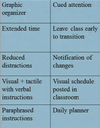Psychiatry-Developmental Disorders Flashcards
(19 cards)
Trajectories of development to compare in the child you are assessing with other kids
Social verbal, emotional, motor and cognitive development
Good questions to ask when assessing emotional and intellectual trajectories
Child’s strengths/weaknesses, stressors (significant life events)
Psychoeducational testing of children
General intelligence, educational achievement, adaptive behavior, perceptual-motor abilities and personality.
A mother presents with an 18 month old boy who has yet to say words and is uninterested in social interactions. She has two other children that had a similar condition and now have odd repetitive behaviors. What is the most likely diagnosis?
Autism Spectrum Disorder. Note that this has a strong family history and is more prevalent in males. Speech/language and lack in social interest are often the 1st presentation.
Diagnostic criteria of autism spectrum disorder
A) Social-emotional reciprocity deficit, nonverbal communication deficits and relationship deficits. B) Fixation with repetitive patterns of behavior, interests or activities. Hyper or hypo reactive to sensation. C) Present early in life D) Significant impairment E) Not better explained by intellectual disability or developmental delay.

Autism spectrum disorder specifiers
+/- Intellectual impairment, +/- language impairment, +/- genetic association, +/- other disorder
A mother brings in her child complaining of difficulty with volume control when meeting people and in meetings. He does not understand social norms and teachers have described him as socially awkward. Repetitive behaviors are absent. What is your diagnosis?
Social (Pragmatic) Communication Disorder
Criteria for diagnosis of Social (Pragmatic) Communication Disorder.
A) Deficits in social communication, impairment in matching communication to context, difficulty following conversational rules and difficulty understanding implicit statements. B) Deficits cause functional limitations C) Early in development D) Not attributed to other disorder like Autism Spectrum Disorder
A mother brings in her 10 year old boy who has had very low achievement scores in reading, writing and math. He does not have an intellectual, visual, auditory or other mental disorder. His school is good and speaks his native language. What is your diagnosis?
Specific learning disorder
A mother brings in her 6 year old boy complaining of inattentiveness and hyperactivity. What is your diagnosis? Why is it important that he is 6 years old?
ADHD. FH has a high concordance with this and symptoms typically onset in childhood, people presenting as adults wanting Ritalin are not given the diagnosis of ADHD. It is good to treat kids this early because there is a risk for injury and substance abuse.
Etiologies of intellectual disability (mental retardation)
Morphogenic errors (fetal alcohol syndrome, trisomy 21, fragile X). Inborn errors (Tay Sachs). Extrinsic influences (hypoxia, trauma, poison).
Criteria for diagnosis of intellectual disability
Adaptive, intellectual and cognitive challenges that present during the developmental period.

Criteria for diagnosis of global developmental delay
Intellectual disability scale not reliably determined, assessments not available and under 5 years old.
Stuttering
Childhood-Onset Fluency Disorder
Difficulty expressing and receiving messages via language
Language disorder
Difficulty with pronunciation of words
Speech sound disorder
Child presents with handwaving, rocking, head banging and self-biting that is not better explained by autistic spectrum disorder or intellectual disability
Stereotypic Movement Disorder
A child presents with multiple motor and 1 or more vocal tics that wax and wane in frequency. This is not due to substance abuse or another medical condition. What is the likely diagnosis?
Tourette’s Disorder.
Good plan for kids with ADHD in school
504 plan



